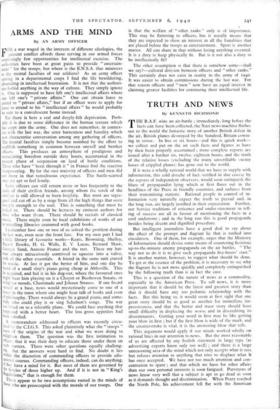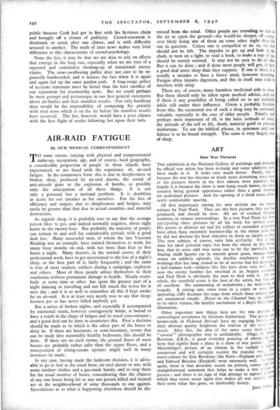T HE R.A.F. wins an air-battle ; immediately, long before the
facts can have been collected, the Nazi news machine flashes out to the world the fantastic story of another British defeat in the air, British planes destroyed by the hundred, Britain cower- ing in terror. In five or six hours—and this is quick work— we collect and put on the air such facts and figures as have by then been properly ascertained ; more complete reports arc issued aftet a further six, twelve, eighteen hours, and the truth of the relative losses (excluding the many unverifiable i.nemy losses of crippled planes) has gone out to the world.
If it were a wholly rational world that we have to supply with information, this cold douche of fact, verified in due course by the reports of independent observers, would soon extinguish the blaze of propagandist lying which at first flares out in the headlines of the Press in friendly countries, and radiates from their transmitting stations. Rational people in control of in- formation very naturally expect the truth to prevail and, in the long run, are largely justified in their expectation. Further, our Service traditions of reticence and under-statement in tell- ing of success are all in favour of mentioning the facts in a cool undertone ; and in the long run this is good propaganda besides being decent and dignified procedure.
But intelligent journalists have a good deal to say about the effect of the prompt and flagrant lie that is rushed into circulation. One of them, for example, urges that the Ministry of Information should devise some means of countering fictitious up-to-the-minute enemy propaganda on the air battles. " The way not to do it is to give such propaganda five-hours' start." It is another matter, however, to suggest what should be done. To get at the essence of the problem, it is necessary to see why the flagrant lie is not more quickly and completely extinguished by the following truth than is in fact the case.
This is a question of the nature of news as a commodity, especially in the American Press. To sell news, it is more important that it should be the latest and greatest story than that it should have any too pedantic relationship with the facts. But this being so, it would seem at first sight that one great story should be as good as another for immediate im- pressiveness, and that the better and truer story should have small difficulty in displacing the worse and in discrediting its disseminators. Getting your word in first may be like getting your blow in first ; but if the first blow is wide of the mark, and the counterstroke is vital, it is the answering blow that tells.
This argument would apply if our minds worked wholly on rational lines in our attention to news. But the most reasonable of us are affected by any foolish statement in large type (as advertising experts know only too well) ; and there is a large unreasoning area of the mind which not only accepts what it sees but refuses attention to anything that tries to displace what it has once accepted. We have not too much attention and con- centration to spare ; and that which we have for other affairs than our own personal interests is soon fatigued. Purveyors of news know very well that a subject is apt to go dead as soon as it demands thought and discrimination. When Peary reached the North Pole, his achievement fell flat with the American public because Cook had got in first with his fictitious claim and brought off a climax of publicity. Crowd-sensation is deadened, or sated, after one climax, and is with difficulty aroused to another. The truth of later news makes very little difference to this characteristic of crowd-psychology.
None the less, it may be that we are wise to rely on effects that emerge in the long run, especially when we are sure of a repeated and cumulative showing-up of sensational enemy claims. The news-swallowing public does not care to be re- peatedly bamboozled, and it notices the fact when it is again and again led up the same garden path. A long-range policy of accurate statement must be better than the least sacrifice of our reputation for trustworthy news. But we could perhaps be more prompt and picturesque in our first general statements about air-battles and their manifest results. Our only handicap then would be the impossibility of competing for priority with rival news which is on the air before the manifest results have occurred. The lies, however, would have a poor chance with the first flight of truths following hot upon their tails.



























 Previous page
Previous page